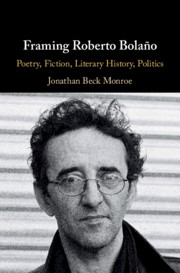Book contents
- Framing Roberto Bolaño
- Framing Roberto Bolaño
- Copyright page
- Dedication
- Contents
- Acknowledgments
- Abbreviations
- Introduction Unpacking Bolaño’s Library
- Part One
- Part Two
- Part Three
- Chapter 6 Dismantling Narrative Drive
- Chapter 7 Making Visible the “Non-Power” of Poetry
- Chapter 8 Poetry, Politics, Critique
- Part Four
- Conclusion From the Known to the Unknown University
- Notes
- Index
Chapter 7 - Making Visible the “Non-Power” of Poetry
Amulet (Amuleto)
from Part Three
Published online by Cambridge University Press: 09 September 2019
- Framing Roberto Bolaño
- Framing Roberto Bolaño
- Copyright page
- Dedication
- Contents
- Acknowledgments
- Abbreviations
- Introduction Unpacking Bolaño’s Library
- Part One
- Part Two
- Part Three
- Chapter 6 Dismantling Narrative Drive
- Chapter 7 Making Visible the “Non-Power” of Poetry
- Chapter 8 Poetry, Politics, Critique
- Part Four
- Conclusion From the Known to the Unknown University
- Notes
- Index
Summary
With the publication of The Savage Detectives, and a year later his much more condensed Amulet, Bolaño turns his full attention as a novelist to poetic interpellation and apprenticeship in Mexico. Narrated by the aesthesis-aligned “mother of Mexican poetry,” “mother of all the poets,” Auxilio Lacouture, Amulet provides a complementary narrative to Distant Star’s mapping of poetic apprenticeships in Chile through the equally gendered, poiesis-aligned figure of Carlos Wieder. Returning again and again to Lacouture’s act of reading (and no longer being to read) a book of poems by the aging poet Pedro Garfias in the bathroom of the Faculty of Philosophy and Letters on September 18, 1968, the date the army and riot police came to occupy UNAM, Bolaño stages a profound tension between a Marxist narrative of historical progress and a Nietzschean model of eternal return. Arcing in the end toward the mythological temporality of ancient Greece, Amulet’s Poe-inflected “horror story,” as Lacouture describes it at the outset, figures history as “another recurring and terribly Latin American nightmare,” at its most decisively utopian moment affirming, through Lacouture’s prophecies, the vision that “Poetry shall not disappear. Its non-power shall make itself visible by other means, in another form.”
Keywords
- Type
- Chapter
- Information
- Framing Roberto BolañoPoetry, Fiction, Literary History, Politics, pp. 130 - 141Publisher: Cambridge University PressPrint publication year: 2019

